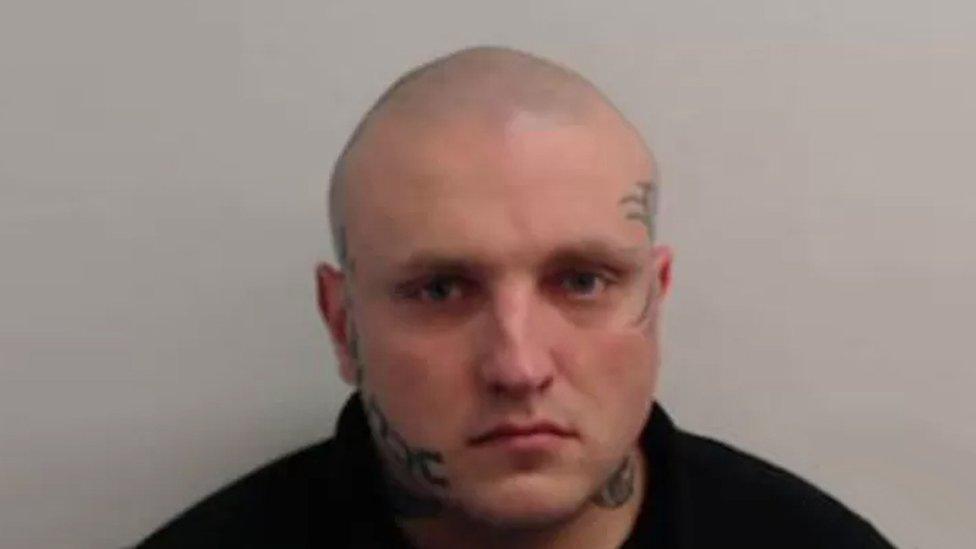How damaging is the trans prisoners row for the SNP?
- Published
First Minister Nicola Sturgeon faces questions on whether Isla Bryson is a woman or not
Scottish politics has been gripped by a row over a transgender rapist being sent to a women's prison. It has prompted an uncomfortable week for Nicola Sturgeon - but will this prove a momentary blip for the first minister, or a longer-running issue?

The Scottish government had hoped it could take some of the heat out the gender reform debate after passing legislation through Holyrood in December.
The bill - which would usher in a system known as "self-identification" because it removes the need to obtain medical reports - was passed by a substantial majority, including MSPs from all parties.
The hope was that once the reforms bedded in and the system was up and running, concerns voiced by opponents would prove unfounded and ministers would emerge on the right side of history.
However in the short term at least, the debate has exploded to new levels of intensity.
First the UK government moved to block the Holyrood legislation by way of a dusty clause in the Scotland Act - unused since the advent of devolution - a move which Ms Sturgeon says will "inevitably" be challenged in court.
And then came the case of Isla Bryson, who was convicted of raping two women but was initially sent to the all-female prison at Cornton Vale having self-identified as a woman while awaiting trial.
Ms Sturgeon has endured some excruciatingly uncomfortable broadcast interviews and parliamentary exchanges on the topic of Bryson, who she refuses to refer to as either a man or a woman. "That individual is a rapist", is her response when asked.
The first minister has also attempted to mount a broader fightback, insisting that the trans community should not be "stigmatised" or be denied rights due to the actions of one individual.
But will this prove a longer-running sore once the immediate news cycle has moved on?
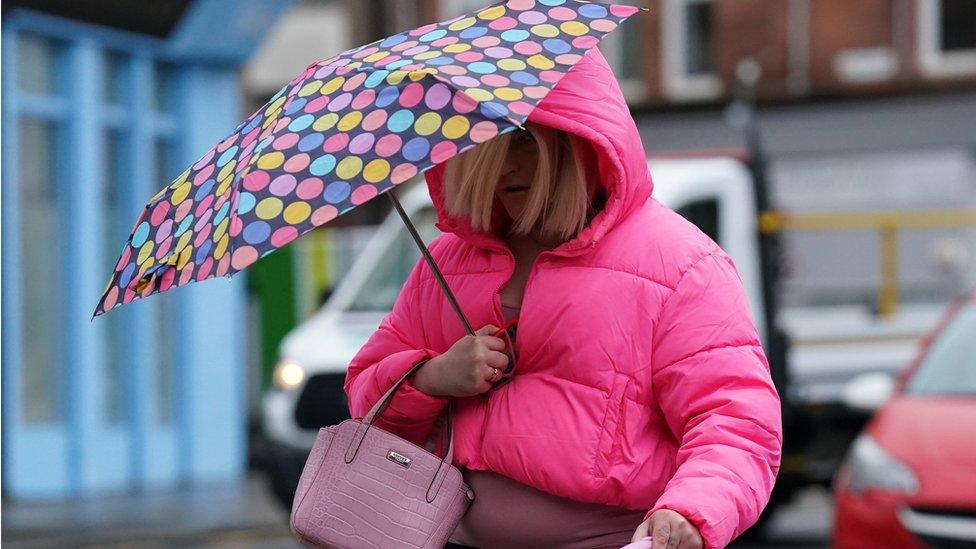
Isla Bryson started identifying as a woman after being accused of two rapes
The first opinion polls conducted since the Bryson row blew up have suggested a negative impact for the SNP, Ms Sturgeon and the cause of independence.
A YouGov survey for the Sunday Times suggested, external that the first minister's personal approval rating has slid into negative territory, while the SNP has shed six percentage points from its Holyrood constituency voting intention.
It should be stressed that the SNP is still miles clear of other parties in Scotland, and is in absolutely no danger of being overtaken at the summit of Scottish politics.
But the crucial context is that the party is planning to use a future election in lieu of a referendum, seeking 50% of the vote to trigger independence negotiations. That is a very high bar to cross, and the margins could be razor-thin - in 2015, the SNP scored 49.97% of the general election vote in Scotland.
So simply being miles clear of Labour and the Conservatives isn't enough, and anything which knocks a few points off the SNP's lead could ultimately be decisive.
There are of course still several years to go until the next election; a UK-wide contest could be as late as January 2025, and the next Holyrood race is not due until May 2026.
Two years is an eternity in politics, and there could well have been a dozen shifts in sentiment and political momentum by then.
That could cut either way, though, in a period when the winds of change seem to be howling through UK politics at gale force.
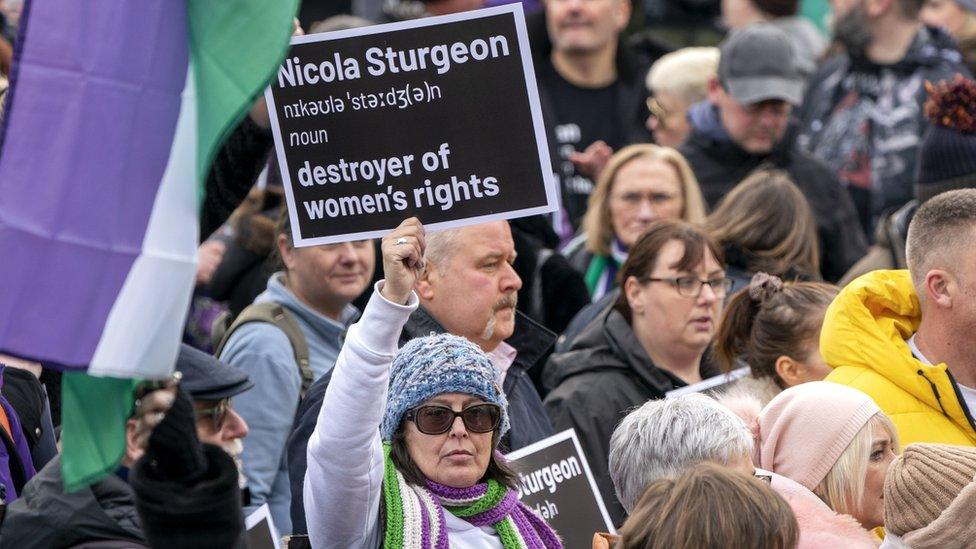
Some opponents of the legislation have taken aim directly at Nicola Sturgeon
The issue of gender reform has sparked unprecedented turmoil within the SNP, formerly seen as an extremely cohesive and united party.
Nine MSPs broke the whip by failing to support the legislation in parliament. There was no noticeable sanction for the rebels, and some - including Ash Regan, who quit her ministerial post in protest - have begun to speak out more frequently.
Other "gender critical" members have become increasingly vocal, with MP Joanna Cherry urging the leadership, external to "eat some humble pie and sort this mess out before it does any more damage to the reputation of our party, parliament and the cause of Scotland's independence".
Former MSP Joan McAlpine has referred, external to self-ID as being the first minister's "personal passion" for which she must bear responsibility, while former SNP deputy leader Jim Sillars describes, external it as "Sturgeon's poll tax".
Meanwhile some allies of the first minister have suggested that rebels should leave the party if they can't get on board.
MP Alyn Smith said the party had a "rip-roaring debate" to come to a "collective view" on gender reform, and that SNP politicians are obliged to defend it. "If you want to be an individual, stand as an individual and see how you get on," he said.
Education Secretary Shirley-Anne Somerville said SNP candidates should "follow through" on manifesto commitments, and that members should "question whether it is comfortable being in a party where you pick and choose the policies after you've been elected".
Ms Sturgeon herself has tried to steer a less confrontational route through the melee, saying that parties should always be willing to deal with policy differences as a matter of "internal party democracy".
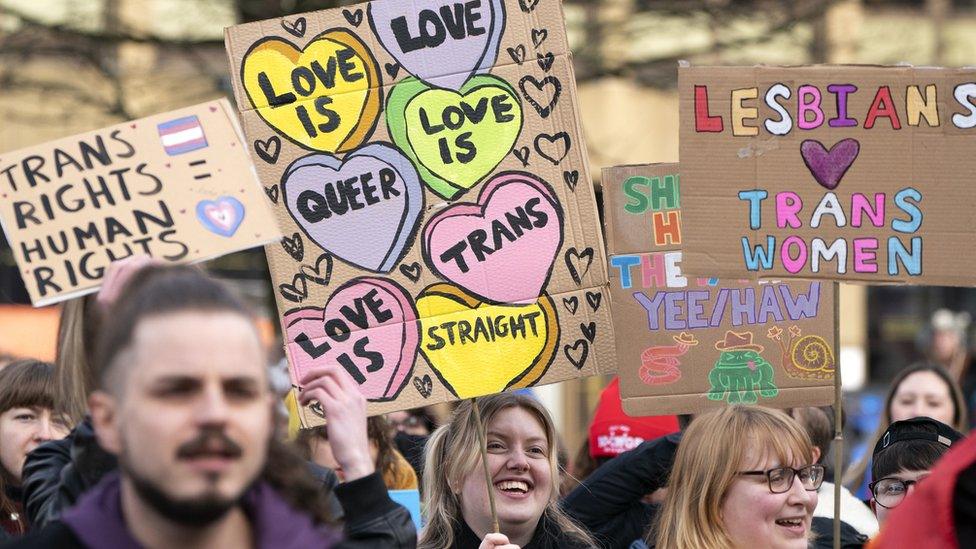
Supporters of the reforms have also held rallies
All of this is significant because the Scottish government is unable to simply move on from the gender debate. Indeed it is gearing up for a constitutional clash with the UK government over it, with Ms Sturgeon promising a legal challenge to the blocking of the Holyrood bill.
When it comes to the legal debate, prisons are unlikely to feature much; the Bryson row has happened under the existing regime. The prison system already broadly accepts how people live in the community, regardless of their paperwork, but ultimately makes its case-by-case decisions based on risk.
However there is a danger for the Scottish government that this has all become one big row about the principle of self-identification in the eyes of the public.
It all feeds into the same debate about how easy it should be for people to change gender, about safeguards in the system and the question of single-sex spaces and services.
Many of these points were well-worn when MSPs were considering the Gender Recognition Reform Bill at Holyrood - ministers will feel they addressed them sufficiently enough, given the bill passed so comfortably.
But the timing of the Bryson furore really could not have been worse for the government, as a real-life case throwing a new light on the old talking points.
That means ministers need to be very careful to close that issue off before they move to challenge the UK government's blockade on the Holyrood legislation.
So Ms Sturgeon's main aim at Monday's question and answer session was to repeatedly underline her argument that "you deal with the individual, you don't stigmatise the whole group".
She noted that "in any group in society there will be individuals who do wrong, who commit crimes and abuse the rights that the entire group enjoy".
But she added: "That will be the case in every case in every group in society, but there is no other group where we accept that the actions of an individual somehow forms a justification for taking away rights from the whole group or not according rights to that group that make their life easier."
The first minister wants it to be crystal clear that when the court challenge comes, she is going to bat for the rights of the wider trans community and Holyrood's right to legislate - and not for the likes of Isla Bryson.
- Published2 February 2023
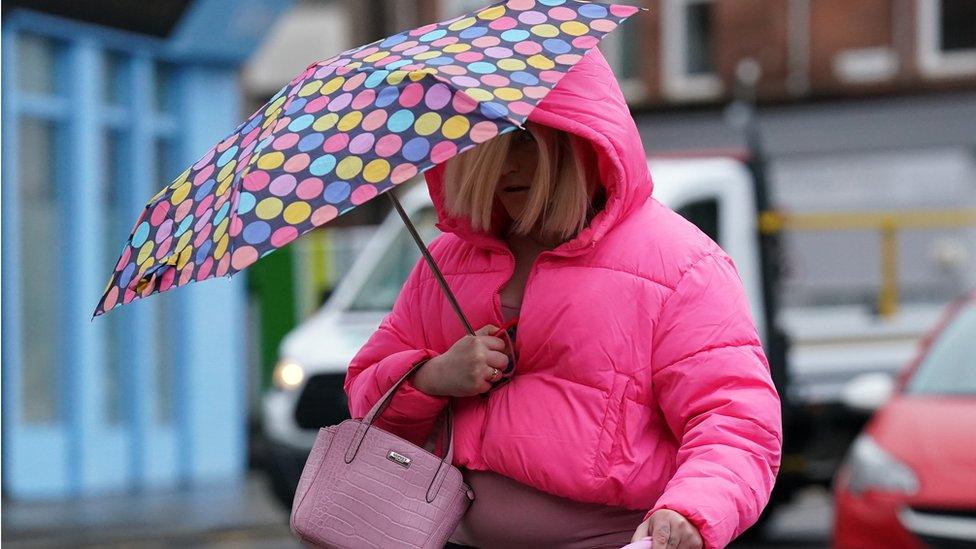
- Published28 February 2023
